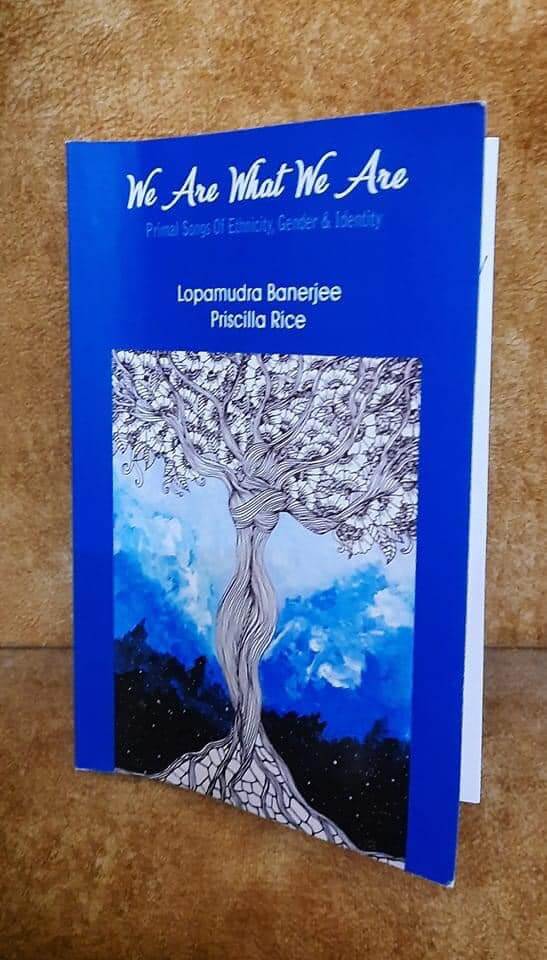Two diaspora poets, Lopamudra Banerjee and Priscilla Rice, explore ethnicity, gender and identity in their poetry collection, We Are What We Are – a review by Amita, exclusively for Different Truths.

When two diaspora poets hailing from different homelands collaborate and bring out a collection of poems, the work becomes an ensemble where unity in diversity forms the essence. This is precisely what we find in the book. We Are What We Are, co-authored by Lopamudra Banerjee (from India) and Priscilla Rice (from Mexico), presently living in Texas, US. With poetry coursing through their veins and an unapologetically candid approach in their expression, the duo engages us in a braided fare of primal songs of ethnicity, gender and identity.
In a patriarchal society, women writers have often represented the evolving parameters of the stereotype of the second sex. Lopamudra Banerjee, a staunch feminist, evinces a precocity from her in-depth readings and admiration for stalwarts like Simone de Beauvoir, Kamala Das, Sylvia Plath, Tasleema Nasreen and Mahasweta Devi. The invincibility of her spirit rings lustily in the lines:
The more you force me to shed tears And surrender my accursed, black moon, Pierce its crust and core in thousand pieces, Gas lighting and choking me, The more I will come back in ripples….
(Poem: I Exist)
Lopa’s poems are poignant, cutting through facets of womanhood…
Lopa’s poems are poignant, cutting through facets of womanhood and exposing the stark truth. In the titular poem, We Are What We Are, she chisels out the feminine roles and sensitivities, both good and evil.
Women. Pathbreakers Trailblazers and survivors And purveyors, bursting With perverse pleasure…
Torn between the calls of her homeland dripping nostalgia and compulsions of the adopted home, there is a restless quest for self-realisation. The poems, essays and monologues are replete with brilliant imagery—Lopa’s forte, which leaves one mesmerised, lingering on as soothing joy or aching pain.
A river within me knows all my high tides and low tides The sun’s birth, descending on my banks and the sundown Melting my fiery skin into dark forebodings Of death and rebirth….
(Poem: A River Within Me)
Kolkata and India live in the consciousness of the poet, effervescing in poetic exuberance.
Kolkata and India live in the consciousness of the poet, effervescing in poetic exuberance. In her poems, she wistfully remembers “the choking familiarity and chaos” of Kolkata (Remembering Kolkata), “the nondescript alley” of Kumartoli (Kumortuli), “the unexhausted story of India spices” (My Mother’s Kitchen), and also:

The dusk of river Ganga Settling itself like a young girl…
Interestingly, both the poets disclose their ethnic identity, similarly focussing on ‘brown’ as a bonding metaphor. Priscilla writes:
God forbid a girl with a brown face Could actually be from here and many places But this is home….
(Poem: Two Worlds. Dos Mundos.)
And Lopamudra, in her evocative lines, says:
My dusky mother planted a soft kiss on my forehead the day she first met my baby skin —brown, drooling, eager to be one with her….
(Poem: Hello Darkness, My Old Friend)
Priscilla’s poems are straightforward, spontaneous outpourings of her passionate self.
Priscilla’s poems are straightforward, spontaneous outpourings of her passionate self. She dwells on her childhood days, her ancestors, the farmworkers, racism in college where she was discriminated against, her love for dance and her mother tongue. There is a liberal use of Spanish in her poems which lends them an honest charm.
Mom says she remembers claiming you as a little girl, With my tias and tio She is sure you’re at least 100 years old, but old mesquite, I Know you’re older They say that mesquite trees can live up to 200 years Or more…
(Majestic Mesquite de mi infancia/ Mesquite Tree from my childhood)
Priscilla Rice is emphatic in her assertions when she articulates her pride in being what she is, her place of origin, her native tongue or food. When she went to a college in Austin, she faced embarrassing situations centred on her pronunciation and vocabulary. She endorses her deep ‘respect’ for her tongue and bemoans how it has been “butchered” in her adopted land:
I am writing this to tell you:
I am not apologising for my tongue
……………
I am going to do what it’s gonna do.
I can’t change my tongue, nor do I want to. This I know to be true(Kay-so, a manifesto)
Idolising Selena Quintanilla Perez, her role model, whom Priscilla’s ‘generation of brown girls and brown boys’ all looked up to, she writes:
Selena helped me to reclaim my culture My language My identity….
(Selena, 1989)
As we go through the poems of Priscilla and Lopamudra, we find their thoughts converging on specific motifs…
As we go through the poems of Priscilla and Lopamudra, we find their thoughts converging on specific motifs like their brown colour, homeland, love and admiration for their mother, grandmother, and the rich legacy they had left behind. Both the poets voice expatriate experiences and choose to speak in a language embracing a world of their own unfettered by impositions which rule their existence.
The book is interspersed with some of Lopamudra’s fine artworks and sketches to beguile you. It is published by Black Eagle Books and is sure to keep the readers spellbound.

Cover photo sourced by the reviewer





 By
By
 By
By
 By
By
 By
By